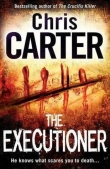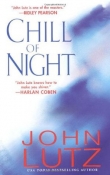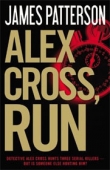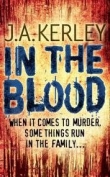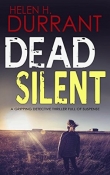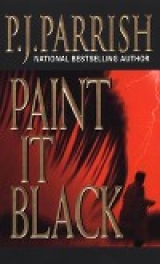
Текст книги "Paint It Black"
Автор книги: P. J. Parrish
Жанры:
Триллеры
,сообщить о нарушении
Текущая страница: 1 (всего у книги 20 страниц)

HUNTING A KILLER
The body lay faceup at the waterline, the skin dusted with sand that glistened in the slanting early morning sun. The waves crept up, gently rocking the body and then recoiling, as if in horror at the gruesome discovery.
There was no face.
And what little skin remained was speckled with black paint.
Louis wet his lips, his stomach queasy. Tatum and Quick had been beaten, but this one . . . This time the face was gone. He steadied himself by taking a few steps away and looking out over the gulf. He concentrated on a lone sailboat, on its shape—a crisp white triangle against the brilliant blue of the sky.
Wainwright walked up to him. “We’re dealing with a serial killer, Louis.”
Louis nodded.
Wainwright pulled out a handkerchief and wiped his face as he looked back down at Mobley and the others.
“Dan,” Louis said, “did you notice the face on this one? He’s getting madder.”
“But you’re wrong about the pattern,” Wainwright said. “He still killed on a Tuesday. That gives us six days to find the bastard.”
He stuffed the handkerchief back into his pocket and trudged up the beach.
After he left, Louis stood there, not quite ready to leave, and not wanting to go back down to where the faceless body lay baking in the sand. . . .
Books by P.J. Parrish
DARK OF THE MOON
DEAD OF WINTER
PAINT IT BLACK
Published by Pinnacle Books
PAINT IT BLACK
P.J. Parrish

PINNACLE BOOKS
Kensington Publishing Corp.
http://www.kensingtonbooks.com

All copyrighted material within is Attributor Protected.
Table of Contents
HUNTING A KILLER
Also by
Title Page
Dedication
ACKNOWLEDGMENTS
Chapter One
Chapter Two
Chapter Three
Chapter Four
Chapter Five
Chapter Six
Chapter Seven
Chapter Eight
Chapter Nine
Chapter Ten
Chapter Eleven
Chapter Twelve
Chapter Thirteen
Chapter Fourteen
Chapter Fifteen
Chapter Sixteen
Chapter Seventeen
Chapter Eighteen
Chapter Nineteen
Chapter Twenty
Chapter Twenty-one
Chapter Twenty-two
Chapter Twenty-three
Chapter Twenty-four
Chapter Twenty-five
Chapter Twenty-six
Chapter Twenty-seven
Chapter Twenty-eight
Chapter Twenty-nine
Chapter Thirty
Chapter Thirty-one
Chapter Thirty-two
Chapter Thirty-three
Chapter Thirty-four
Chapter Thirty-five
Chapter Thirty-six
Chapter Thirty-seven
Chapter Thirty-eight
Chapter Thirty-nine
Chapter Forty
Chapter Forty-one
Chapter Forty-two
Chapter Forty-three
Chapter Forty-four
Chapter Forty-five
Chapter Forty-six
Chapter Forty-seven
ABOUT THE AUTHOR
Copyright Page
To our good bud, Bacchus, for all
his help
ACKNOWLEDGMENTS
You won’t find Sereno Key on any map of Florida; it is a place of the imagination. But the area that inspired it—the southwest coast of Florida—is very real. In setting PAINT IT BLACK there, we have taken a few liberties with geography, but most of the places in the story are real, and we have tried to stay true to the distinct ambiance of our setting.
We were helped by some fine people along the way. A huge thank-you goes to:
Dave Jensen and Vanessa Viglione, who know where all the bodies are buried on Captiva and beyond.
George Lynch of the “Miss Barnegat Light” at Fisherman’s Wharf; John Derickson of “Robin’s Song” at Bahia Mar; and fishing guide Greg Rhodes, who educated us on the ways of boats, bloody fish, and the backbay.
Dr. Dave Donson of New York Methodist Hospital, in Brooklyn, NY, who inspired the original germ of the story and led us through its medical thicket.
Kara Winton, public information officer; Officer Kim Lindsay; and Major Kevin B. Anderson, all of the Fort Myers Police Department. Thanks for your insights and enthusiasm.
And last but not least, to Sam Johnson, chief investigator, Office of the Medical Examiner, in Fort Myers, for being so generous with his time and expertise.
We would also like to acknowledge some source material. The following books are excellent guides to those wishing to learn more about the early days of the Federal Bureau of Investigation and criminal profiling: The FBI: A Comprehensive Reference Guide by Athan G. Theoharis, Tony G. Poveda, Susan Rosenfeld, and Richard Gid Powers; The FBI by Ronald Kessler; and, of course, the seminal works of FBI investigator John Douglas, especially Journey Into Darkness (with Mark Olshaker).
March 1986
Chapter One
The car was just sitting there, its hazard lights blinking like beacons in the darkness. In a flash of lightning, he could see someone walking around the car, in and out of the shadows.
Stop here? No, no, not right. Rain. Too . . . too . . . It wasn’t supposed to happen here. Stop. Stop!
He slowed the truck, pulling onto the shoulder about thirty feet behind the stalled car. A man came around the car and looked back at him, shielding his eyes in the glare of the truck’s headlights.
The wipers beat with the thick pounding of his heart. He could see the man’s face. And his eyes, hopeful, as they squinted back at his rescuer.
Yes . . . oh, yes.
He eased the truck forward, closing in on the car. He left the truck idling and got out. The man seemed to relax slightly as he walked toward him. That was funny. He had to struggle to keep from laughing.
“Hey, man, thanks for stopping,” the man said. “Shit, ain’t nobody gonna stop to help on a night like this.”
The man was talking, talking . . . about his dead battery, about the rain, about his wife being mad, his lips flapping on and on about stupid shit.
The noise hurt his head and he thought about letting the man go but he knew it would be days before he could get another. There was no reason to waste tonight.
He stared at the man’s face. Something started pounding in his head, like the mad rush of waves on the beach, muffled, endless, pounding water. The face was there in front of him, the face. He put his hands over his ears and shut his eyes.
“Hey, something the matter with you?”
He opened his eyes. The man’s face glistened in the headlights and his mouth was moving, but he couldn’t hear anything but the rushing water in his head.
He forced himself to focus, to listen. The man was asking him something, he could hear him now, faint, like he was talking underwater. Jumper cables, the man was asking him if he had jumper cables.
The man’s face was rain-slick, the color of wet leaves. It had looked different back in the parking lot. He hadn’t been sure but now . . .
Yes . . . oh, yes. Perfect.
He walked back to his truck. Reaching under the seat, he pulled out a dirty rag. He could feel the outline of the knife beneath it. Carefully, he stuck it inside his jacket. Closing the truck door, he reached back into the flatbed and pulled out a long metal pole. He started back toward the car.
No! Stop! Not right . . . it’s not right!
He turned back to the truck bed. He rummaged through the debris, his heart pumping faster, his hands groping for it. Where the hell was it? If it wasn’t there, he would have to let him go.
Finally, his fingers closed around the wet aluminum. He pulled out the can of spray paint. He let out a breath.
Yes. Okay . . . oh, yes. It’s okay now.
He walked back toward the car, the pole held at his side, the can and knife secure in his jacket. The pounding echoed inside his heading, hitting the spot behind his eyes.
The man was peering into the open hood of his car. He looked up, his eyes searching for the jumper cables. He frowned when he saw the pole.
“What you gonna do with that, hang curtains?” The man started to laugh. He laughed, falling against the car, reeling from booze and the hilarity of his own joke.
The laughter floated on the thick, wet air, like a low rumble of thunder. It rumbled inside his skull, Ping-Ponging there like a half-forgotten childhood chant.
The rain pelted on the metal hood, the blood pounded in his head, like waves hard on the beach. It hurt his ears, this noise. He didn’t like it, the noise. And the man’s smell, booze and sweat. He didn’t like that either. He stared at the laughing face until it started to melt, the features falling away with the rain until he could see nothing left but the color of his skin.
Slowly, he raised the metal pole. He touched it to the man’s leg.
A sharp bang. The man reeled back against the car and fell to the ground. The man lay there, twitching, his eyes rolled back, his mouth moving, like a fish on a dock.
He waited, standing over the man, waited for him to come to. The gaping wound in the man’s leg was wet and black. The rain was coming down harder now. It was taking too long. He scanned the dark causeway road for headlights.
Do it . . . finish it.
He set the pole against the car. Lifting the man under his arms, he dragged him down the slope away from the road toward the shore. The man was limp, like a corpse, but he was still alive on the inside. He could smell the pumping blood, hear his heart still beating.
He dumped him near the rocks under a sea grape tree. A flash of lightning revealed the man’s face. He was conscious, his eyes wide with terror now, his lips moving with silent questions.
What? What does he want? Why? He wants to know why? The bastard wants to know why?
He reached in his jacket and pulled out the knife. It was dark here away from the road and he couldn’t see the man below him. But he could smell him. He plunged the knife blindly down but it met sand. He raised it again and this time felt the satisfying thud as it met flesh. Again, again, again, and the man was still trying to move. His moans drifted up in the darkness mixing with his own frenzied grunts. Blade against sand, blade against flesh, over and over. Finally, quiet.
He stood up, panting, his arm quivering. The lightning illuminated the man below him for a moment, just long enough for him to see that the face was still there. The man was gone but the face was still there. And the waves in his head, they were still there, too.
No! Fucker! Goddamn you to hell! You piece of shit. You should have been scraped from your mother’s womb with a spoon!
With a cry, he dropped to the knees and began to pound at the face. He kept pounding, right, left, right, left in a raging rhythm, over and over, the head flopping from side to side in the wet sand.
He stopped. He tilted his head back, closing his eyes, letting the rain wash over him, letting his breathing return. The air was thick and metallic with blood and lightning. A shudder of ecstasy rolled through him. The waves had stopped.
Picking up his knife, he struggled to his feet, spent. There was just one thing left now. He reached into his jacket for the can of spray paint. It was gone. Had he forgotten it? No, he had put it in his jacket back at the truck. It must have fallen out. He scanned the darkness of the rocks. There was a lot of trash. It could be anywhere now. He felt a wave of panic closing and he knew he had to stop it because the waves would come back.
A headlight beam washed across the tree branches. He froze, waiting for the car to pass.
No . . . no. Forget the paint. Fuck it. There will be another.
Slipping the knife in his jacket, he trudged back up to the road. Picking up the metal pole, he went back to the truck.
He was putting the pole in the flatbed when another flash of approaching headlights made him look up. The car was slowing and he stood tensed, ready. But the car sped past, tires hissing on the wet road.
He smiled. Like the dumb fucker said, ain’t nobody stopping to help on a night like this. He got in the truck and drove slowly away, leaving the empty car’s red hazard lights pulsing weakly in the darkness.
Chapter Two
The jet dipped its left wing and the window filled up with turquoise.
Louis Kincaid pressed his face against the window and stared down at the water just two thousand feet below. He could see a speckling of sailboats, a race in progress maybe. They looked like white birds drifting against a cloudless blue sky, and it gave him a momentary rush of vertigo, as if he were upside down. He shook his head, a soft laugh bubbling out of him. The old woman in the seat next to him looked over, frowning slightly.
“The Gulf of Mexico,” he said, pointing. “Man, that’s pretty, don’t you think?”
She nodded briskly and buried her face back in her Barbara Cartland paperback. Louis looked back to the window. A sweep of beach came into view and then a block of custard-colored buildings along the shoreline.
A soft voice came over the intercom, announcing they would be landing in Fort Myers in ten minutes. Louis felt a quiver in his stomach. It wasn’t nerves over his first trip in a plane so much as anticipation of what lay ahead.
He leaned back in the seat, his gaze drifting back to the window, the same question in his head that had been bouncing around there for days now. What in the hell was he doing here anyway?
Dodie . . . it was all his fault. If Dodie hadn’t called, gotten him out of bed. Or if it hadn’t been so damn cold that morning. Or if his damn car battery hadn’t been dead again. If any of that hadn’t happened, he might not have accepted Dodie’s offer, might not be on this plane now, going to a place he didn’t know, a job he didn’t really want.
Hell, not just a job. A hundred bucks a day, with a minimum of fifteen hundred, just to do some digging around and find out who killed some woman’s husband. Dodie had told him his friend, the wife’s lawyer, needed someone special for the job.
“I’m a cop, not a private dick,” Louis had told Dodie.
“For a hundred bucks a day, you can be any kind of dick you want,” Dodie said. “You want the job or not?”
He didn’t want it. But there was nothing else on the horizon. He was finished as a cop in Michigan, if not technically, then practically. There was nothing to do but start over again. He shook his head slowly. Twenty-six and starting over again. And not even with a real badge. He didn’t even have a gun anymore.
He looked back out the window, at the checkerboard of white tile roofs and green palm trees.
“Shit,” he muttered. “At least it’ll be warm.”
Southwest Florida International Airport was small, modern, aggressively upbeat, and air-conditioned to arctic levels. Louis slipped on his University of Michigan varsity jacket and waited for his bag, searching the crowd for Dodie. It struck him that the people had a different look here, lighter somehow, than they had seemed back in the cold of Michigan. Men in bermudas and baseball caps, women in sundresses and sandals. He focused on one woman standing impatiently at the Avis counter. She was thin and dry as a twig, eyes hidden behind big Jackie O shades, wearing a white pantsuit and heavy gold jewelry, with one of those yappy little cockroach dogs tucked under her arm.
“Kincaid!”
Louis spun at the sound of the familiar baritone. He was looking for a pale pitted face under a red ball cap and at first he missed him. But then, there was Sam Dodie, tan and smiling. Dodie thrust out a hand and Louis grasped it, surprised by the surge of feeling in his chest at the sight of his ex-boss.
For a second, they just looked at each other; then Dodie cleared his throat awkwardly and took a step back.
“Well, you made it. How was the flight?” Dodie said.
“Good. Long layover in Atlanta. Sat in the bar and watched the Hawks-Knicks for two hours.”
“Didn’t know you were a basketball fan.”
“I’m not. Football.” Louis smiled. “It’s good to see you, Sam. You look . . . good, really good. Retirement agrees with you.”
Dodie patted his belly. “Margaret’s taking cooking classes, French shit.”
Louis found himself staring at Dodie’s outfit, a pale yellow, boxy short-sleeved shirt worn loose over his shorts. The shirt’s fabric was so sheer he could see Dodie’s undershirt beneath.
“Interesting shirt,” Louis said.
Dodie ran his hands down his chest. “You don’t like it? It’s called a guayabera. It’s Cuban. Lots of guys down here wear ’em. They don’t pit out.”
Louis laughed. “Just never saw you in anything but flannel before.”
“Well, things is different here, Louis. I’m different here.” He picked up Louis’s bag. “Well, let’s get going or we’ll get caught in rush hour. Margaret’s waiting supper on us.”
“Hold on.” Louis disappeared into the crowd. He returned, lugging an animal carrier.
“What the hell’s that?” Dodie asked, staring at the black cat inside.
“A cat. Its name is Isolde.”
“What?”
“Issy . . . it’s called Issy.”
“Shit. Where’d you get it?”
“It’s a long story,” Louis said with a sigh. “Come on, let’s go.”
They headed west, out of the airport, in Dodie’s Chevy, through a scrubland dotted with scrawny cows and billboards. The pastures soon gave way to a scorched-earth suburban sprawl of Arbys, Home Depots, and tract subdivisions with names like Cape Verde Isles and Paradise Palms. As they neared downtown Fort Myers, the numbing newness fell away, replaced by a pleasing funk of mom-and-pop motels, small businesses, and palm-shaded streets.
“It’s not what I expected,” Louis said, eyeing a roadside stand whose sign promised JUMBO SHRIMPS AND ORANGES SHIPPED.
“What isn’t?” Dodie asked.
“Florida.”
“Everybody says that. What’d you expect?”
“I don’t know. Coconuts. Water.”
“This is the mainland. Plenty of water where we’re heading.”
As they approached a high-arching bridge, Louis caught sight of a gray-blue river. The Caloosahatchee, Dodie told him. They went through a pretty neighborhood, the boulevard lined with towering royal palms standing guard like a precision drill team lining a parade route. Dodie flipped down his visor and steered the car due west into the sun.
They started across a two-lane causeway. The sign said WELCOME TO SERENO KEY. HOME OF THE WORLD’S BEST FISHING.
“This is it,” Dodie said proudly. “My little piece of paradise. All the water a man could want.”
They were crossing a large open bay, and the confluence of water and sky was sudden and startling, like being injected into a sparkling, bright blue ball. The bay extended in all directions as far as Louis could see, broken by green islands and the razor-wakes of darting Jet-Skis.
The causeway rose over a low-slung bridge and Louis watched a pelican ride the current, keeping pace with the car. Then, suddenly, it curved out to the water and rode inches above until it suddenly nose-dived in, like a paper glider crashing into the grass. The pelican surfaced with a fish in its bill. Louis laughed.
“What’s so funny?” Dodie asked.
“Nothing, nothing,” Louis said softly, settling back in the seat.
Sereno Key wasn’t a very big place, Dodie told him, as they touched back onto land. Only a couple thousand folks, some trailer parks, motels, landscaping nurseries, marinas, boatyards, and a small shopping area everyone called “the town center.” Sereno was a dog-bone-shaped island sandwiched between the Fort Myers mainland to the east, Pine Island to the north, and the gulf barrier islands of Sanibel-Captiva to the west. The mainland, Dodie informed him, was where “regular folk” lived, and Sanibel-Captiva was where all the tourists and “money folk” lived.
“We’re kinda in between here,” Dodie said, slowing the Chevy to accommodate the key’s two-lane main road. “Lots of retirees and folks who just want to be left alone.”
Sam and Margaret Dodie’s home was on the north end of the key on Tortuga Way, in a modest neighborhood cut with canals and lined with palms. It was a tidy, two-bedroom bungalow rendered charming by small touches: yellow paint with turquoise trim, a picket fence, shutters, and a porch decorated with wood cutouts of dolphins.
“Made them myself with the jigsaw,” Dodie said. He brushed his hand through a windchime as he opened the screen. “Margaret! He’s here!”
Louis had never met Margaret Dodie before, had never been invited to the Dodie home in the months he had lived in Mississippi. Sam Dodie had been the sheriff, his boss, and it had been a prickly relationship, growing from distrust to respect. But it had been strictly professional right to the end. Part of it, he knew, had been the place. Born and raised in Black Pool, Margaret Dodie probably had never had a black man sit at her dinner table. And her husband had probably never thought of inviting one, even Louis.
But if Margaret Dodie now felt the slightest bit uncomfortable, she didn’t show it. She greeted Louis cheerfully, like she’d known him for decades. She was a plump woman, bright blue eyes sunk in a pink pincushion face, framed by a helmet of silver-blond hair. She fussed over him, showing him to her guest room, setting up a litter tray for the cat, and finally ushering him and Dodie out onto the patio with a small cooler of beer.
The Dodies’ house looked out over a canal that led out through the twisting mangrove-lined waterway to Matlacha Pass. The patio was just a concrete slab but it was furnished with comfortable lawn chairs and festooned with Japanese lanterns and orchids, another of Margaret’s new obsessions, Dodie explained. Dodie’s own diversion, a new Sundance Skiff, sat at a small wood dock.
“You fish?” Dodie asked.
“Nope,” Louis said, smiling.
“You will, you stay here long enough.” Dodie took a swig of beer.
Louis settled back into a lounge chair. He could feel his muscles unclenching, his mind slowing. Maybe it was just the combination of the breeze, the pleasant brackish smells, or just the beer. Maybe it was Dodie’s cheerful yakking. Whatever it was, he found himself thinking about childhood again, his “other-child childhood,” as he had only recently come to think of it. This time Higgins Lake in Michigan. A sunset over gray-blue water. The smell of marshmallows on a fire. The feel of cold sand between his toes. The first summer his foster parents had taken him up North.
A sound drew his eyes to the canal. A couple of kids were paddling out toward the open water in a canoe. Out toward the pass, Louis could see other small islands dotting the water like squat green pond turtles. It looked almost oriental somehow, like pictures he had seen of Japan.
“Another?” Dodie asked, reaching into the cooler.
“Why not?”
Dodie handed him a fresh Heineken. “I remembered.”
“I see.” Louis nodded to the Heineken that Dodie had just uncapped for himself. “When you start drinking this foreign shit?” he asked, smiling.
“Can’t get no Jax here.”
“You told me once you’d never leave Mississippi.”
“Well, I thought about trying to stick around, you know, afterward.” Dodie shrugged. “But Margaret, well, she always wanted to see Florida, so we came down here on that vacation I’d been promising her. After Busch Gardens, we came over to Sereno Key here and decided we kinda liked it.”
“Nice place,” Louis said.
“I guess I should thank you for it,” Dodie said. “What you did up in Mississippi got me a nice big retirement settlement.”
They fell silent, Louis lost in his memories of Black Pool.
“So you don’t miss Mississippi?” Louis asked.
“ ’Bout as much as a hemorrhoid,” Dodie said.
Dodie let out a satisfied belch. Louis looked out at the water. A large white wading bird had appeared on the dock, its slender neck bent in a graceful S, its long legs picking carefully along. Suddenly, it took flight over the water, its huge white wings stark against the deepening sky.
“Okay, so why me for this job?” Louis asked.
“Well, I heard you were out of work,” Dodie said.
“You hear why?”
“Yeah . . . yeah, I did.”
“You hear all of it?” Louis asked without looking at him. “You heard what I did?”
Dodie nodded slowly. Margaret came out to announce that dinner was in ten minutes. Dodie waited until she left.
“You don’t owe me no explanation, Louis,” he said. “But I’ll listen if you wanna talk about it.”
Louis’s hands encircled the cold bottle. “Maybe later,” he said. “So what exactly am I supposed to be investigating here?”
“A man named Walter Tatum was found murdered, and his wife, Roberta, is the prime suspect,” Dodie said. “Her lawyer is the one who’s hiring you. He wants you to find other suspects, or at least something so’s a jury would find reasonable doubt.”
“When do I meet this lawyer?” Louis asked.
Margaret came out onto the porch. “Sam, Mr. Bledsoe’s here.”
Dodie rose, looking at Louis. “How ’bout right now?”
Scott Bledsoe was a bland-looking man of about forty, tall and pale with thinning blond hair wisping over the sunburned spot on his scalp. His outfit of polo shirt, khakis, and sockless loafers spoke of family money somewhere, or at least an Ivy League diploma hanging on the wall. He moved with an odd, liquid grace that made Louis think of the white bird on the dock.
In deference to Margaret, dinner conversation was kept to small talk and compliments to Margaret on her yellowtail snapper in mango-tequila sauce. Louis learned that Bledsoe had lived in Fort Myers all his life and had never been farther north than Tallahassee, where he waited tables to put himself through law school. He and Sam Dodie had become friends after meeting at the marina; they both loved to fish.
“So, why me, Mr. Bledsoe?” Louis asked, as Margaret brought out plates of key lime pie.
“Sam said you were good,” Bledsoe said.
Louis took a bite of the tart pie. “There have to be plenty of private investigators here you could have used,” he said. “Why pay to bring me all the way down here?”
Bledsoe glanced at Dodie, then back at Louis. “Well . . . ah.” He toyed with his fork. “Frankly, I thought a black man might be better for the job.”
Louis sat back in his chair. “And you couldn’t find one around here?”
Bledsoe again looked at Dodie. “Sam said you were good.”
Dodie was busy with his pie. Louis looked over at Margaret, who looked embarrassed but confused as to why she should be.
“I think I’ll get the coffee,” she said, rising.
Bledsoe looked back at Louis, his pale cheeks coloring slightly. “Roberta Tatum is black,” he said. “Her husband Walter was black. I thought having someone she could relate to might be helpful.”
“You’re her lawyer. You can’t relate to her?” Louis asked.
Bledsoe’s lips pulled into a line. “My client hired me because I’m the best criminal lawyer around here. But Roberta Tatum sometimes has trouble communicating. She’s . . . well, difficult.”
Louis looked over at Dodie. For a second, he was pissed, but he wasn’t sure why. Then Dodie looked up at him, and over a forkful of yellow pie, his blue eyes met his.
“I just thought you could use the work, Louis, that’s all,” he said.
Louis’s eyes slid back to Bledsoe and stayed there as he tried to reason whether he should be upset or not.
“Why don’t we go outside?” Dodie said, rising.
Louis rose and followed Dodie and Bledsoe to the patio. For several minutes, the three sat quietly watching the sunset. Dodie clicked his Zippo and as he lit the citronella candles, Louis studied his face. He looked like a kid who had gotten caught doing something wrong but wouldn’t apologize until he could figure out exactly what it was he did.
Bledsoe finally spoke. “Look, Mr. Kincaid . . . if I’ve offended—”
“Louis. If I’m going to work for you, it’s Louis.”
Bledsoe nodded and sank back in his chair. Even in the dim light of the candles, Louis could see the relief in the man’s face. Roberta Tatum wasn’t the only one who had trouble communicating.
“So, how was Walter Tatum killed?” Louis asked.
“Police believe he was first disabled with a shotgun wound to his leg,” Bledsoe said. “But he died from seventeen stab wounds in his chest. He was also beaten very badly, but that was postmortem.”
Louis heard a tightness enter Bledsoe’s voice with the last words. He had a feeling that despite being “the best criminal lawyer around,” Bledsoe had little experience with such violence.
“His body was found in some rocks along the causeway,” Bledsoe said.
“The same one we drove in on,” Dodie added.
“Was he killed where he was found?” Louis asked.
Bledsoe nodded. “Shot by his car, then dragged down to the rocks and stabbed and beaten.”
“They think a woman did this?” Louis asked.
“Murder for hire,” Bledsoe said. “She’s got an ex-con brother. He’s disappeared but there’s a warrant out for him. They think he actually pulled it off, but that they conspired together.”
“What does she have to gain?” Louis asked.
“They have some money, a very profitable store out on Captiva, and there was life insurance.”
“Did you bring the file?” Louis asked.
“No, I wasn’t sure Sam wanted to get into all that tonight. Stop by my office tomorrow and we’ll go over things.”
Louis wished Bledsoe had brought the file. Suddenly, he was anxious to get started. “Witnesses?” he asked.
Bledsoe sighed loudly. “We should be so lucky. Not a one. People fish along the causeway but no one’s come forward. The ME figures it happened late, and to make matters worse, it was raining hard that night. Sereno Key is a quiet place, we close up pretty early over here. Not much reason for anyone to come over from the mainland late at night unless they live here.”
Louis was silent, his mind already starting to turn over the pieces.
“So, where do you start?” Bledsoe asked.
“With your client,” Louis said. “Tomorrow morning?”
Bledsoe nodded. “I’ll call Chief Wainwright and arrange it.”
They fell silent. The air was heavy with the scent of low tide, orchids, and citronella. The sky was ablaze, orange and pink ribbons cutting across the red backdrop.
“Nice sunset tonight,” Dodie said.
Louis had never seen such a spectacular display. “Where do those colors come from?” he said, almost to himself.
“Dirt,” Bledsoe said. “Just a lot of dirt in the air.”
